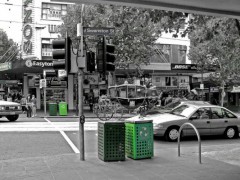Op Knocks: Sustainable Growth in Melbourne
Melbourne is a city known for its love of vintage and alternative fashion. Linked to this, is a love of the op shop, or thrift shop. The hundreds of op stores throughout the city range from small neighbourhood shops to giant warehouse superstores.
What if you could create a completely sustainable business with used products? One business in Melbourne is doing just that, and more.
Melbournians are becoming more conscious of buying ‘green,’ with a recent study showing that more people are considering the impact on the environment when shopping. It is this combination of increased green awareness and love for alternative and recycled fashion that has created an opportunity for a growing and sustainable local business.
As most op shops are an extension of mainstream charities, they run on a standard and largely sustainable model of donated goods and volunteer staff. However op shops are not necessarily designed with growth in mind. Furthermore, one of the largest expenses of op shops is waste disposal. Essentially, when you are asking the public to donate their unwanted goods that is often exactly what you get. It is not uncommon for ruined electrical goods, unwearable clothing and broken furniture to be dumped on their doorsteps, incurring high and unnecessary expense.
By using volunteer staff and donated goods – but also incorporating growth, eliminating waste disposal expense and even employing staff, Green Collect tweaks the traditional model and delivers sustainable business solutions.
The organisation began as a pilot project aimed at providing a pathway for homeless and long-term unemployed people to re-enter the workforce, through a cork collection and recycling program. Since 2002 the program has attracted funding and sponsorship, and has grown to employ 40 people, and offer training and volunteer opportunities and now operates three stores across Melbourne.
Interestingly, Green Collect’s sustainability as a business is linked largely to the unsustainable nature of many large organisations and to the unsustainable nature of human consumption within the modern economy.
While relying on traditional donations of used clothing and second hand books, Green Collect also stock fair trade and eco-friendly products. However, it is Green Collect’s waste collection program which is the most interesting. Waste which would otherwise be dumped in a landfill is collected by staff and volunteers and businesses are charged accordingly. Most of the waste Green Collect receives is office and e-waste – out of date or out of fashion computers, mobile phones, CD’s, paper, binders, furniture and so on. The business then ‘upcycles’ these products and turns them into goods to sell.
It is here that Green Collect taps into the ‘appetite for novelty’ that humans as consumers so constantly crave. Economist Tim Jackson highlights that this insatiable appetite for ‘new stuff’ drives much of the unsustainable modern economy. In creating such products as the floppy disk notebook, Green Collect have been able to cleverly wedge themselves into the consumer need for novelty space, while also allowing customers to be guilt free eco-shoppers.
This solution has proven viable and many other cities in Australia now employ similar models such as Reverse Garbage in Brisbane and Sydney. This business model effectively tackles our sustainability challenges, and more businesses need to adopt similar re-use methods if we are to embrace a future driven by sustainable growth.
Tags: australia, economist, ENVIRONMENT, floppy disk notebooks, GLOBALISATION, green collect, growth, melbourne, Pacific, recyclable, sustainability, tim jackson, upcycle


